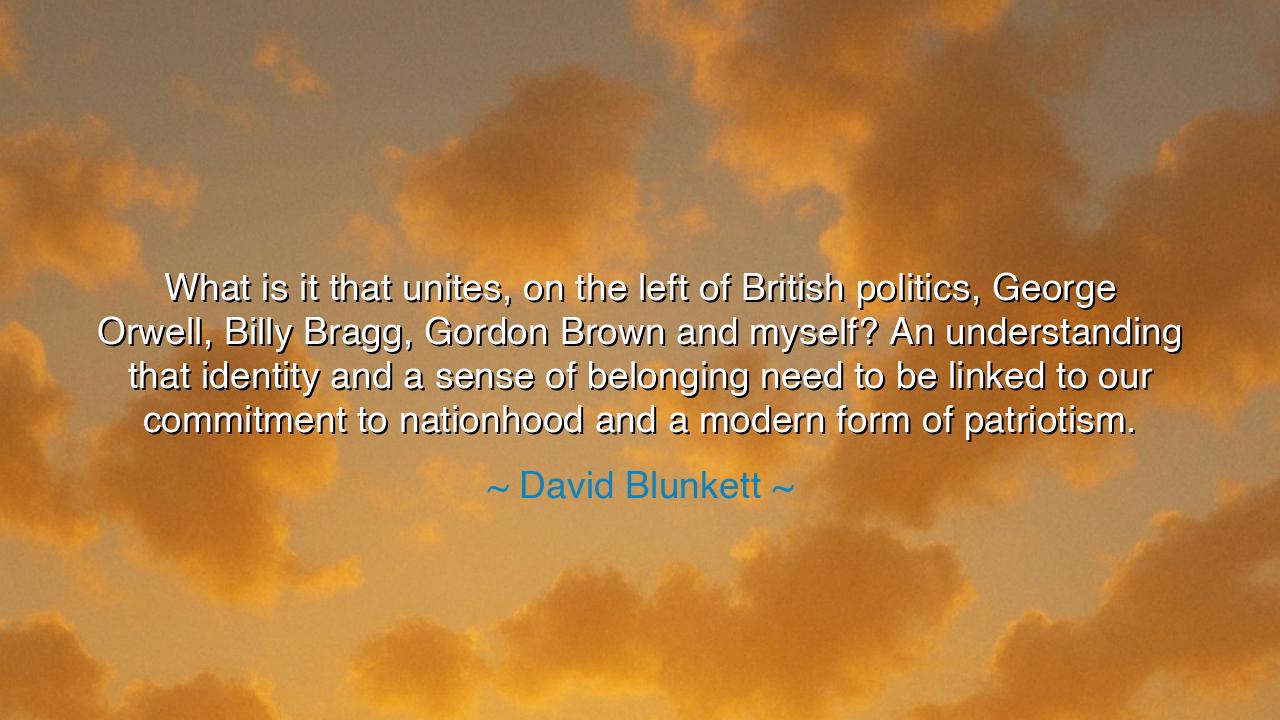
What is it that unites, on the left of British politics, George
What is it that unites, on the left of British politics, George Orwell, Billy Bragg, Gordon Brown and myself? An understanding that identity and a sense of belonging need to be linked to our commitment to nationhood and a modern form of patriotism.






“What is it that unites, on the left of British politics, George Orwell, Billy Bragg, Gordon Brown and myself? An understanding that identity and a sense of belonging need to be linked to our commitment to nationhood and a modern form of patriotism.” Thus spoke David Blunkett, a servant of the people, whose words summon forth the ancient and eternal question: what binds a nation together? In this reflection he declares that even across the differing voices of the political left, there lies a shared truth—that no society can flourish unless its people are rooted in identity, strengthened by belonging, and elevated by patriotism.
The origin of this thought lies in the tension within democratic life. For in times past, the left often spoke the language of class and equality, while the right claimed the mantle of nationhood and pride. Yet Blunkett, echoing the wisdom of Orwell and others, reminds us that the two are not enemies but companions. To strive for justice without love of nation is to build upon sand; to proclaim patriotism without justice is to honor a hollow idol. Thus, he calls for a modern form of patriotism, one that unites rather than divides, one that is not bound to nostalgia alone but lives in the struggles and hopes of the present.
History offers us clear examples of this union. Consider George Orwell, whose pen flayed tyranny in all its guises, yet who loved England fiercely, even amid her flaws. In his writings during the Second World War, he called for a socialism rooted in patriotism, believing that the common people’s love for their land was the very force that could resist fascism. He proved that one could be a critic of injustice while still a defender of nation, for true patriotism is not blind obedience but a commitment to make one’s homeland better, freer, and truer to its ideals.
Blunkett also names Billy Bragg, the balladeer of working people, whose songs spoke of struggle, hope, and belonging. For Bragg, identity and nationhood are not abstractions but lived realities—the shared stories, accents, and traditions that give a people strength. His art reminds us that patriotism is not only about flags or parades, but about the lived dignity of communities, the safeguarding of their culture, and the promise that no one is left behind. In this way, song and politics converge upon the same truth: the nation is strongest when it belongs to all its people.
We also hear in Blunkett’s words the echo of Gordon Brown, whose speeches often proclaimed Britain’s values of fairness and solidarity as the true foundation of national pride. Brown insisted that belonging could not be reduced to heritage alone but must be continually renewed by our actions toward one another—by how we care for the vulnerable, how we uphold democracy, how we honor our common bonds. In this vision, patriotism is not passive, but active; not backward-looking, but forward-building.
The lesson for future generations is clear: do not allow patriotism to be captured by one faction, nor let it be reduced to symbols without substance. Link your love of nation to your work for justice, equality, and belonging. Recognize that the banner of the homeland is most honored not in the mouths of those who shout the loudest, but in the hands of those who serve its people faithfully. Let your identity not divide you from others, but remind you of your shared place within the greater whole.
Practical actions flow from this wisdom. Celebrate your culture, your community, your history, but also labor to make your nation more just and inclusive. Speak of patriotism not only in times of war, but in the daily acts of citizenship—voting, volunteering, teaching, and building. Listen to those who differ from you, for in shared dialogue lies shared belonging. Above all, root your love of country in deeds, not in slogans, so that your patriotism is seen in the lives you uplift, not only in the words you speak.
Thus let Blunkett’s words endure as both call and reminder: “Identity and a sense of belonging need to be linked to our commitment to nationhood and a modern form of patriotism.” For the nation that weds belonging to justice, and patriotism to identity, is a nation unbreakable, a people united not only by heritage but by hope, not only by history but by the future they build together.






AAdministratorAdministrator
Welcome, honored guests. Please leave a comment, we will respond soon